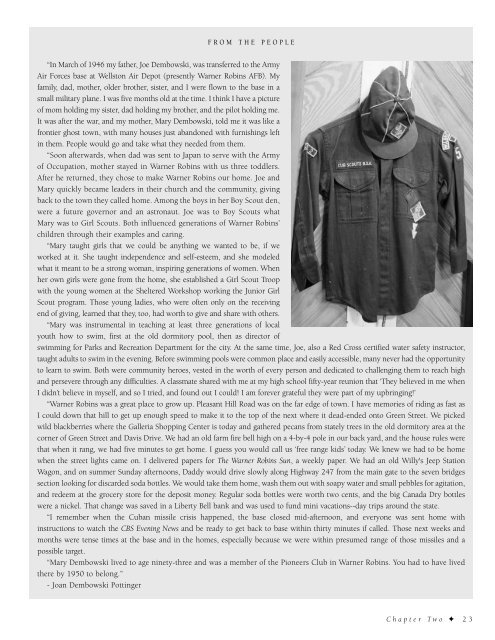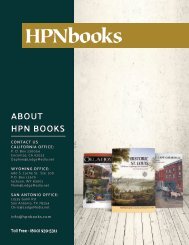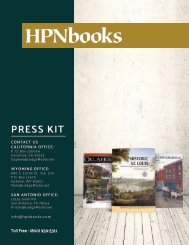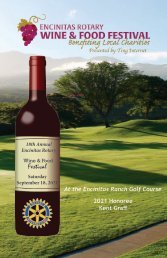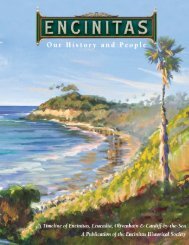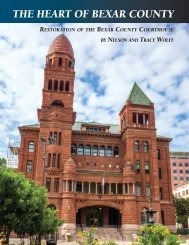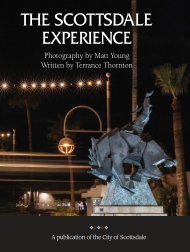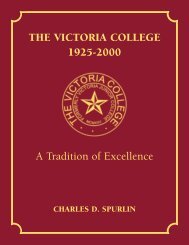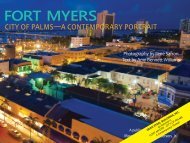Planes, Trains & Heroes: A Story of Warner Robins and the Robins Region
An illustrated history of Warner Robins, Georgia, paired with histories of the companies and organizations that have made the city great.
An illustrated history of Warner Robins, Georgia, paired with histories of the companies and organizations that have made the city great.
- No tags were found...
Create successful ePaper yourself
Turn your PDF publications into a flip-book with our unique Google optimized e-Paper software.
FROM THE PEOPLE<br />
“In March <strong>of</strong> 1946 my fa<strong>the</strong>r, Joe Dembowski, was transferred to <strong>the</strong> Army<br />
Air Forces base at Wellston Air Depot (presently <strong>Warner</strong> <strong>Robins</strong> AFB). My<br />
family, dad, mo<strong>the</strong>r, older bro<strong>the</strong>r, sister, <strong>and</strong> I were flown to <strong>the</strong> base in a<br />
small military plane. I was five months old at <strong>the</strong> time. I think I have a picture<br />
<strong>of</strong> mom holding my sister, dad holding my bro<strong>the</strong>r, <strong>and</strong> <strong>the</strong> pilot holding me.<br />
It was after <strong>the</strong> war, <strong>and</strong> my mo<strong>the</strong>r, Mary Dembowski, told me it was like a<br />
frontier ghost town, with many houses just ab<strong>and</strong>oned with furnishings left<br />
in <strong>the</strong>m. People would go <strong>and</strong> take what <strong>the</strong>y needed from <strong>the</strong>m.<br />
“Soon afterwards, when dad was sent to Japan to serve with <strong>the</strong> Army<br />
<strong>of</strong> Occupation, mo<strong>the</strong>r stayed in <strong>Warner</strong> <strong>Robins</strong> with us three toddlers.<br />
After he returned, <strong>the</strong>y chose to make <strong>Warner</strong> <strong>Robins</strong> our home. Joe <strong>and</strong><br />
Mary quickly became leaders in <strong>the</strong>ir church <strong>and</strong> <strong>the</strong> community, giving<br />
back to <strong>the</strong> town <strong>the</strong>y called home. Among <strong>the</strong> boys in her Boy Scout den,<br />
were a future governor <strong>and</strong> an astronaut. Joe was to Boy Scouts what<br />
Mary was to Girl Scouts. Both influenced generations <strong>of</strong> <strong>Warner</strong> <strong>Robins</strong>’<br />
children through <strong>the</strong>ir examples <strong>and</strong> caring.<br />
“Mary taught girls that we could be anything we wanted to be, if we<br />
worked at it. She taught independence <strong>and</strong> self-esteem, <strong>and</strong> she modeled<br />
what it meant to be a strong woman, inspiring generations <strong>of</strong> women. When<br />
her own girls were gone from <strong>the</strong> home, she established a Girl Scout Troop<br />
with <strong>the</strong> young women at <strong>the</strong> Sheltered Workshop working <strong>the</strong> Junior Girl<br />
Scout program. Those young ladies, who were <strong>of</strong>ten only on <strong>the</strong> receiving<br />
end <strong>of</strong> giving, learned that <strong>the</strong>y, too, had worth to give <strong>and</strong> share with o<strong>the</strong>rs.<br />
“Mary was instrumental in teaching at least three generations <strong>of</strong> local<br />
youth how to swim, first at <strong>the</strong> old dormitory pool, <strong>the</strong>n as director <strong>of</strong><br />
swimming for Parks <strong>and</strong> Recreation Department for <strong>the</strong> city. At <strong>the</strong> same time, Joe, also a Red Cross certified water safety instructor,<br />
taught adults to swim in <strong>the</strong> evening. Before swimming pools were common place <strong>and</strong> easily accessible, many never had <strong>the</strong> opportunity<br />
to learn to swim. Both were community heroes, vested in <strong>the</strong> worth <strong>of</strong> every person <strong>and</strong> dedicated to challenging <strong>the</strong>m to reach high<br />
<strong>and</strong> persevere through any difficulties. A classmate shared with me at my high school fifty-year reunion that ‘They believed in me when<br />
I didn’t believe in myself, <strong>and</strong> so I tried, <strong>and</strong> found out I could! I am forever grateful <strong>the</strong>y were part <strong>of</strong> my upbringing!’<br />
“<strong>Warner</strong> <strong>Robins</strong> was a great place to grow up. Pleasant Hill Road was on <strong>the</strong> far edge <strong>of</strong> town. I have memories <strong>of</strong> riding as fast as<br />
I could down that hill to get up enough speed to make it to <strong>the</strong> top <strong>of</strong> <strong>the</strong> next where it dead-ended onto Green Street. We picked<br />
wild blackberries where <strong>the</strong> Galleria Shopping Center is today <strong>and</strong> ga<strong>the</strong>red pecans from stately trees in <strong>the</strong> old dormitory area at <strong>the</strong><br />
corner <strong>of</strong> Green Street <strong>and</strong> Davis Drive. We had an old farm fire bell high on a 4-by-4 pole in our back yard, <strong>and</strong> <strong>the</strong> house rules were<br />
that when it rang, we had five minutes to get home. I guess you would call us ‘free range kids’ today. We knew we had to be home<br />
when <strong>the</strong> street lights came on. I delivered papers for The <strong>Warner</strong> <strong>Robins</strong> Sun, a weekly paper. We had an old Willy's Jeep Station<br />
Wagon, <strong>and</strong> on summer Sunday afternoons, Daddy would drive slowly along Highway 247 from <strong>the</strong> main gate to <strong>the</strong> seven bridges<br />
section looking for discarded soda bottles. We would take <strong>the</strong>m home, wash <strong>the</strong>m out with soapy water <strong>and</strong> small pebbles for agitation,<br />
<strong>and</strong> redeem at <strong>the</strong> grocery store for <strong>the</strong> deposit money. Regular soda bottles were worth two cents, <strong>and</strong> <strong>the</strong> big Canada Dry bottles<br />
were a nickel. That change was saved in a Liberty Bell bank <strong>and</strong> was used to fund mini vacations--day trips around <strong>the</strong> state.<br />
“I remember when <strong>the</strong> Cuban missile crisis happened, <strong>the</strong> base closed mid-afternoon, <strong>and</strong> everyone was sent home with<br />
instructions to watch <strong>the</strong> CBS Evening News <strong>and</strong> be ready to get back to base within thirty minutes if called. Those next weeks <strong>and</strong><br />
months were tense times at <strong>the</strong> base <strong>and</strong> in <strong>the</strong> homes, especially because we were within presumed range <strong>of</strong> those missiles <strong>and</strong> a<br />
possible target.<br />
“Mary Dembowski lived to age ninety-three <strong>and</strong> was a member <strong>of</strong> <strong>the</strong> Pioneers Club in <strong>Warner</strong> <strong>Robins</strong>. You had to have lived<br />
<strong>the</strong>re by 1950 to belong.”<br />
- Joan Dembowski Pottinger<br />
Chapter Two ✦ 23


